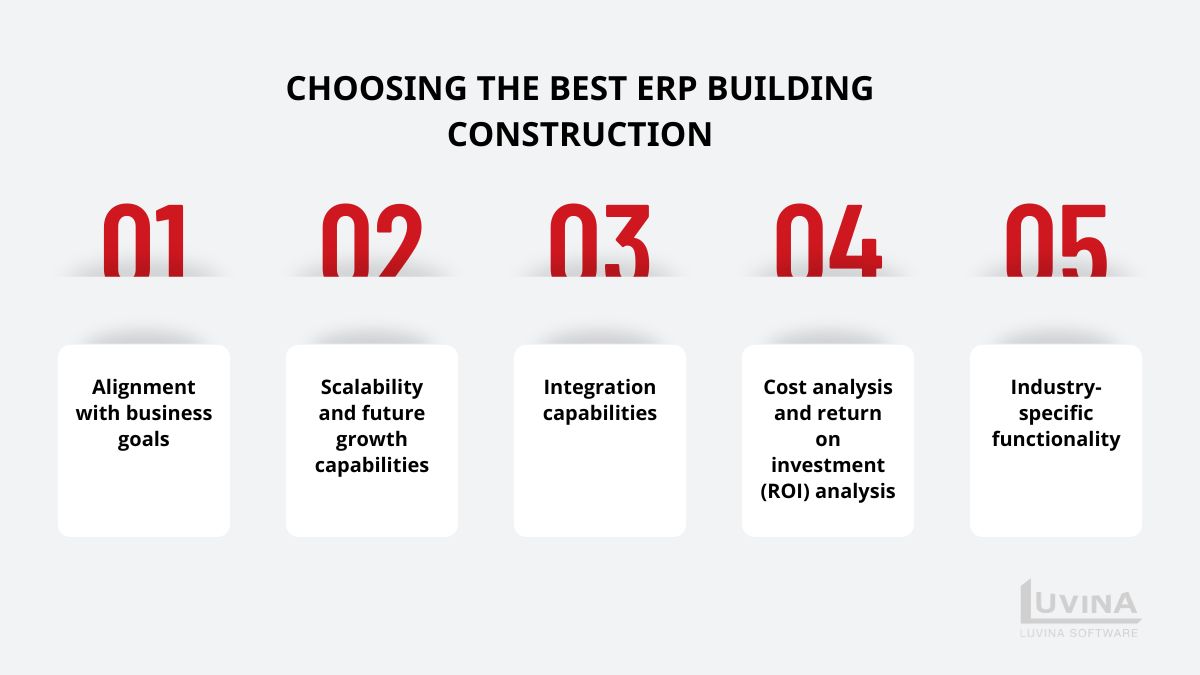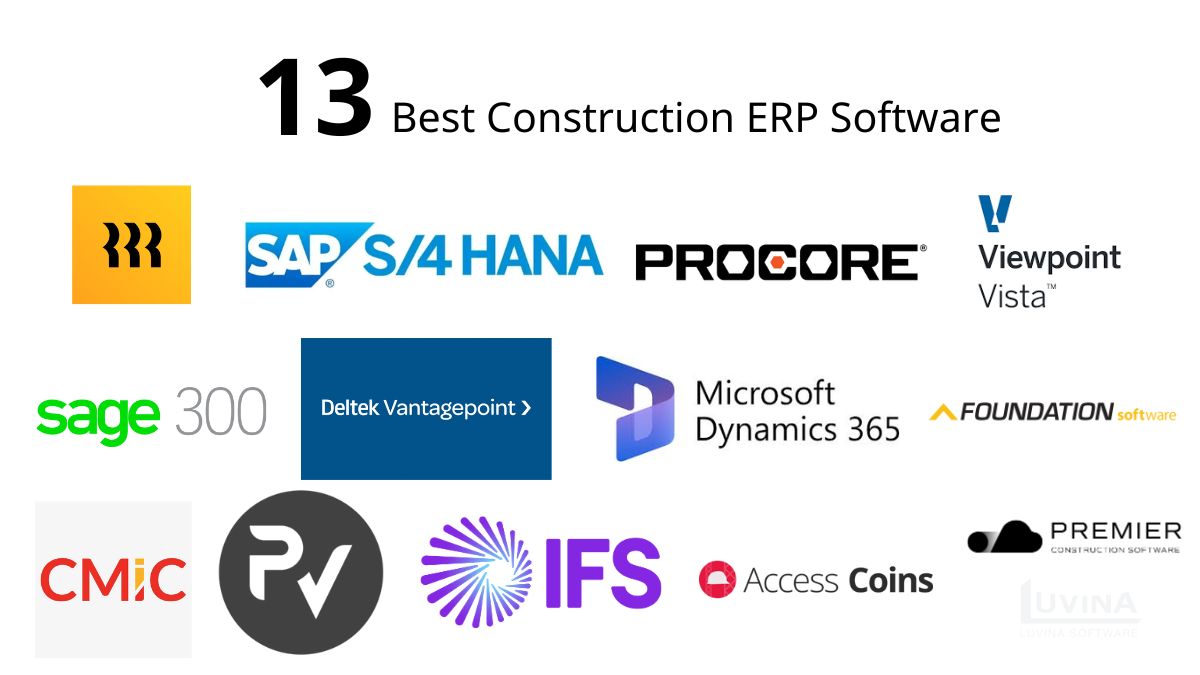The best construction ERP software works like the central nervous system of a business. Think of a city: it cannot function if traffic lights, the power grid, and communication networks don’t connect. Similarly, a construction company needs an ERP to integrate projects, finances, and teams seamlessly.
In this guide, we will address why ERP is important, how to find the right solution, and identify the leading construction ERP software in the marketplace today.
Why does the best construction ERP software matter
Selecting the best construction ERP software might set costly errors apart from smooth operations. Construction projects are complex due to:
▪️ Tight schedules
▪️ Strict budget restrictions
▪️ Multiple stakeholders involved
A construction ERP system serves as a central hub. It integrates:
▪️ Project management
▪️ Finance
▪️ Purchasing
▪️ Manpower coordination
Businesses may increase efficiency, lower errors, and obtain real-time insight into project performance by using the best construction ERP software. Managing tasks alone is not the point; rather, it’s about making wise judgments that safeguard profit margins and projects remain on schedule.
How to choose the best ERP for building construction
Selecting the best construction ERP software requires an understanding of your organization’s size, workflow, and specific building needs. Not all ERP systems are the same. You generally have three options:
1. Flexible enterprise software solutions (highly customizable)
2. Construction-specific ERPs (lifecycle and subcontractor management)
3. Mid-tier ERPs (faster setup, simpler management → ideal for small to mid contractors)

Select the right ERP by taking into account these major factors:
Alignment with business goals: Aligning the organizational objectives of your construction firm – such as collaboration, financial analysis, or streamlining the labor process – with your specific software strategies.
Scalability and future growth capabilities: Ensuring the ERP can accommodate companies with more complicated projects, future growth, and additional user requirements.
Integration capabilities: Evaluate the project’s capacity to easily integrate project management applications, payroll systems, accounting programs, and sometimes existing software tools, as well as those under consideration.
Cost analysis and return on investment (ROI) analysis: Looking beyond just the costs to consider installation, education, support, and other long-term benefits of the software at hand.
Industry-specific functionality: The right ERP for home builders of residential buildings should provide functionality such as subcontractor management, purchase order tracking, and compliance monitoring, to name just a few features.
Selecting the best construction ERP software is about fitting technology to your operational reality so teams may remain on schedule, manage expenses, and make data-driven decisions from the beginning to the end of a project.
Top 13 construction ERP software
After understanding why ERP matters and how to choose the right system, it’s time to explore the market leaders. The following are some of the best construction ERP software solutions currently available.

1. Rippling
Simplifying HR, payroll, and IT administration, Rippling is a flexible platform and one of the top construction ERP software packages for companies wanting effective employee coordination and management. Its integrated approach simplifies time tracking, benefits management, and onboarding, enabling construction companies to be productive and compliant across many initiatives.
Pros:
▪️ Friendly, intuitive interface that saves time in training
▪️ Human resources, payroll, and IT features that have smooth integration
▪️ Excellent employee onboarding and benefits management
▪️ Correct time management suited to the demands of the construction labor.
Best for: HR, payroll, and workforce management
2. SAP S/4HANA
Designed for major construction firms, SAP S/4HANA is a powerful ERP system that qualifies among the best construction ERP software options for complicated, multi-site projects. Advanced project planning, real-time financial insights, and smart automation are provided to enable businesses to maximize processes and make wise, data-driven decisions at every level of operations.
Pros:
▪️ Top-of-the-line reporting and financial management tools
▪️ Very configurable for construction with partner add-ons
▪️ Thorough analysis and insights through SAP Business Technology Platform
▪️ Cloud integration for increased operational efficiency
▪️ Perfect for global companies with varied product lines.
Best for: Complex, multi-site construction projects by big corporations.
3. Procore
A top construction project management platform, Procore is known for boosting job site efficiency and teamwork. Being a high-rise construction ERP, it enables companies to easily integrate with accounting and financial systems while controlling budgets, schedules, and paperwork. Its solutions enable project teams to remain in sync and guarantee exact, real-time reporting throughout every phase of construction projects.
Pros:
▪️ Great cooperation includes field documentation tools and characteristics.
▪️ Robust third-party integrations with QuickBooks, Sage, and other solutions
Best for: Field productivity and complete project management
4. Viewpoint Vista
Viewpoint Vista provides a single lens through which you may view every financial and operational aspect of your construction projects; this is what it accomplishes. One of the best construction ERP systems available, it merges accounting, payroll, job costing, and resource planning into a single platform. Vista enables contractors to maintain strict cost management and operational efficiency across many projects by combining field data with back-office operations.
Pros:
▪️ Tracking of subcontractors and complete job costing
▪️ Perfect connection with field tools, including Trimble Field View
▪️ Cloud or on-premise choices for flexible deployment
Best for: Cost management, accounting, and financial management
5. Sage 300
What if one simple, user-friendly platform could handle project expenses, contracts, and workforce planning? Sage 300 makes this possible, setting itself as a leading high-rise construction ERP software for small to medium-sized construction companies. With construction-specific accounting and payroll tools, it enables businesses to remain compliant while keeping financial correctness under effective project performance monitoring.
Pros:
▪️ Features of strong contract management and cost control
, construction-specific general ledger, and payroll
▪️ Strong support and compliance customized for the American market
Best for: Small-to-medium-sized building businesses concentrating on financial management.
6. Deltek Vantagepoint
Tracking projects and income precisely can make or break a business in the fields of engineering, architecture, and consulting. For companies needing integrated project management and invoicing features, Deltek Vantagepoint is among the best construction ERP software solutions. By linking CRM, timesheets, and resource planning, its platform gives professionals a real-time view of project performance and financial condition.
Pros:
▪️ CRM, timesheets, and resource planning integration
▪️ Specifically designed for companies with high service-to-project ratios
▪️ Revenue forecasting methods and good reporting
Best for: Consulting, architectural, and engineering companies needing sophisticated project invoicing.
7. Microsoft Dynamics 365
Microsoft Dynamics 365 provides a flexible ERP system for construction companies striving for scalable development and flawless integration. One of the top 10 construction ERP software, it blends AI-driven insights with advanced financial management, project tracking, and supply chain integration. Its adaptability with other Microsoft programs guarantees seamless corporate processes, so companies looking for flexibility and customization should find it perfect.
Pros:
▪️ Advanced financial management and reporting solutions
▪️ Perfect Microsoft ecosystem application integration
▪️ Insights powered by artificial intelligence help to guide educated decision-making.
Best for: Businesses putting scalability, flexibility, and personalization as top priorities
8. Foundation Software
Foundation Software provides a construction-oriented ERP solution for contractors wanting to simplify labor and financial administration. As one of the best construction ERP software, it helps contractors and subcontractors keep correct budgets and run effective workforce operations by excelling in job cost accounting, payroll, and project management. Designed to fulfill the particular needs of building projects are its industry-specific qualities.
Pros:
▪️ Thorough job cost accounting and payroll management
▪️ Integrated project management techniques for effective flow
▪️ Made especially for subcontractors and contractors.
▪️ Supports effective labor cost management and precise budgets.
Best for: Contractors and subcontractors controlling project financials and staff.
9. CMiC
CMiC provides a full-suite ERP solution meant to meet the particular needs of building companies. Regarded as one of the best construction ERP systems, it combines job costing, field operations, and document management into one platform, therefore enabling general contractors to effectively supervise every part of their projects. Its consistent method enables teams to simplify processes and have real-time awareness across several work locations.
Pros:
▪️ Job costing and project tracking tools
▪️ Integrated field operations and document management
Best for: General contractors and project tracking
10. ProjectVIEW ERP
For project-driven construction and engineering companies, ProjectVIEW ERP offers a customized platform that is especially good at handling sophisticated, multi-site operations. Known as one of the best construction ERP software, it provides a completely integrated suite including real-time budgeting, procurement, subcontractor management, cash flow, and risk assessment. Its modular architecture and cloud accessibility let groups remain in contact and retain control across coastal, maritime, and interior projects.
Pros:
▪️ Created especially for construction, engineering, and energy industries.
▪️ A single platform for financial planning, purchasing, cost management, and planning
▪️ Project score tools and advanced risk management
▪️ Powerful backing for EPC projects, offshore wind, and oil and natural gas
▪️ Accessible from mobile devices, cloud deployable, and web-based.
▪️ Variable licensing for the Asia-Pacific and EMEA areas
Best for: Project-driven companies needing industry-specific capabilities, real-time control, and detailed visibility.
11. IFS Cloud ERP
IFS Cloud ERP offers a customized solution for building companies managing asset-intensive and service-driven projects that links project management, asset management, and field service. Acknowledged as one of the top construction ERP software, it guarantees large-scale infrastructure projects keep on schedule and within budget by offering real-time project costing, change management, and integrated budgeting tools. Whether on-site or remotely, its mobile-friendly platform enables teams to effectively handle challenging activities.
Pros:
▪️ Lifecycle assistance for facilities and assets
▪️ Change management and real-time project costing
▪️ Great mobile resources for field service management
▪️ Industry-tailored for infrastructure, energy, and aviation projects
Best for: Big, complicated construction projects needing coordinated asset and project management.
12. Access COINS ERP
Designed expressly for contractors, developers, and housebuilders, Access COINS ERP is among the best construction ERP software options for middle-tier building companies. Fully integrated cost planning, job costing, and subcontractor management offered help companies maintain compliance and control across all project phases. Access COINS ERP enables expanding construction companies in several areas by virtue of its robust presence in the MENA, Australia, and UK regions.
Pros:
▪️ Job costing and full cost planning
▪️ Control of subcontractors and compliance software
▪️ Robust local presence in MENA, Australia, and the United Kingdom
▪️ Perfect for medium-sized building enterprises
Best for: Developers, housebuilders, and mid-tier contractors
13. Premier Construction ERP
Designed for small- to medium-sized contractors and construction companies, Premier Construction ERP provides a contemporary, cloud-based interface. Combining job costing, accounting, and document control in an easy-to-use interface, it serves as a complete ERP building construction solution. Its quick deployment and straightforwardness fit perfectly for companies handling several projects without the complexity of corporate-level solutions.
Pros:
▪️ Rapid deployment of a user-friendly interface
▪️ Integrated job costing, bookkeeping, and document management
▪️ Makes project monitoring easier for construction companies ranging from small to medium-sized.
▪️ Supports 5-50 active projects’ efficient workflow.
Best for: Subcontractors and small-to-mid developers
Final thoughts
The right ERP can transform how a construction company operates. It improves:
▪️ Financial tracking
▪️ Staff coordination
▪️ Cost management
▪️ Project monitoring
With real-time visibility and streamlined processes, ERP empowers smarter, data-driven decisions. The result: higher efficiency and a construction business ready for sustainable growth.
You can get in touch with Luvina’s experts for tailored advice on choosing the best construction ERP software. We stand ready to offer expert counsel and assist you in selecting the best fit for the size, flow, and project needs of your company.









Read More From Us?
Sign up for our newsletter
Read More From Us?
Sign up for our newsletter